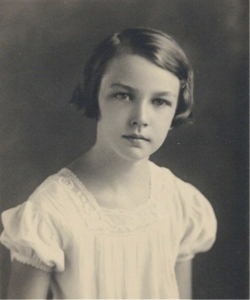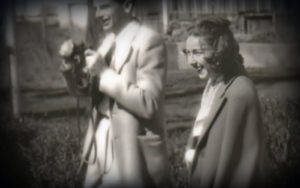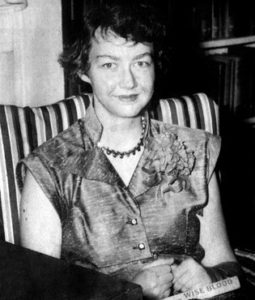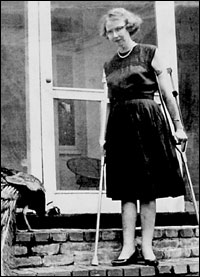23 Nov Flannery O’Connor: “Make Me a Mystic”
In the story “The Enduring Chill” by the fiction writer of the American South, Flannery O’Connor, an atheistic character by the name of Asbury is visited by a Jesuit priest. Asbury, who fancies himself literary and intellectual, comes home to die and is met by his mother, a plainspoken woman whom he considers foolish. The priest who visits him is half-blind and half-deaf. In their exchange, he tells Asbury to ask for the Holy Ghost.
“’The Holy Ghost?’ Asbury said.
‘Are you so ignorant you’ve never heard of the Holy Ghost?’ the priest asked.
‘Certainly I’ve heard of the Holy Ghost,’ Asbury said furiously, ‘and the Holy Ghost is the last thing I’m looking for!’
‘And He may be the last thing you get,’ the priest said, his one fierce eye inflamed.”
A typical short story by Flannery O’Connor, who died in 1964, contains variations of three main characters: a woman of the American Irish-Catholic variety for whom genteel respectability is the moral measurement in all things; a much younger woman or man who is often atheistic with a coldly intellectual sense of superiority; and a third person, wounded or misshapen in some grotesque way, who bursts upon the other two lives and shatters them in the manner of Jesus cleansing the temple, or Paul getting knocked off his horse on his way to Damascus, or the wind of the Holy Spirit whipping into the Upper Room.
Flannery O’Connor summarized her fiction thus in a letter to a friend: “All my stories are about the action of grace on a character who is not very willing to support it.”
The characters are often formed from Flannery O’Connor’s own life: the older respectable woman is a version of her mother, whom she lived with for the last twelve years of her life when her literary output was at its height; the younger, judgmental, person is a version of herself; and the creature that crashes in upon them, breaking them open, could be seen as a human version of the disease that forced itself upon the author and changed her life.
As a typical story unfolds, it builds within her darkly comic vision until the shattering happens and the story’s universe shifts. In “The Enduring Chill” the Holy Spirit appears to Asbury finally in the form of a water stain on the ceiling above his bed which appears to him as a “fierce bird” that embodies “a purifying terror.”
Flannery O’Connor was born in Savannah, Georgia, in 1925 and was an only child. The Irish Catholic gentility of Lafayette Square in that city, where she spent her childhood, provided the setting for her early formation. Today, the house is open to visitors and provides evidence that from the beginning she had flair and promise. A childhood book, The Fairy Babies, is dismissed by eight-year-old Flannery with the pronouncement, written on the title page, “Not a very good book.” In the upstairs bathroom, we are told, she sometimes placed cushions and flowers in the tub and settled in to read stories to bewildered friends.
A succession of life-changing events followed her coddled childhood in Savannah. The Depression of the 1930s forced the O’Connor family to move to Atlanta, in central Georgia, and then the nearby town of Milledgeville as her father struggled to find work. His health declined, and in 1937 he was diagnosed with lupus, an autoimmune disease. In 1941, on the cusp of his daughter’s sixteenth birthday, he died. She received her bachelor of arts from the local college, the Georgia State College for Women, and her breakout move came in 1945 when she was granted a scholarship to the Iowa Writers’ Workshop, where her life as a fiction writer began.
How and when did Flannery (as everyone refers to her) move beyond the American-Irish Catholicism of her upbringing with its tendency toward lace-curtain respectability? Her spiritual clear-sightedness may have existed early on, leading eventually to the earthy mysticism of her fiction, but it did not come without a struggle. Her Iowa experience was her first taste of the wider secular world, and though she clung to Catholic practices and devotions all her life, this non-religious milieu provided her with the kind of spiritual crisis that drove her beyond complacent Catholicism into the heart of Christianity.
A prayer journal that she kept for nearly two years during that crucial period at the Iowa Writers’ Workshop provides a glimpse into the stumbling search for God of her early adulthood. The journal was published a few years ago and includes a facsimile of the original, and so one can see the neat flowing script as well as the scratching and crossings-out. “You are the slim crescent of a moon that I see and my self is the earth’s shadow that keeps me from seeing all the moon,” she writes awkwardly on the journal’s first extant page.
She is not happy with this situation, and in subsequent entries she howls over the imperfection that prevents her from knowing more of God—her mediocrity, laziness, writerly ambition, lack of kindness. She pleads for “the gift of grace” and asks for God’s help “to feel that I will give up every earthly thing for this.” Then in scrunched-up writing, she adds an afterthought: “I do not mean becoming a nun,” as if she’s concerned that God might misinterpret her request.
“I want to love,” she writes in one of the last entries. “Take me, dear Lord, and set me in the direction I am to go.” That direction revealed itself three years after her final journal entry: the diagnosis of the same autoimmune illness that had killed her father–lupus. She had embarked on a writing career in the intellectual and literary atmosphere of the northeastern United States, and now was forced to return to the backwater town of Milledgeville, where her mother managed a dairy farm.
A front parlour of the rambling two-storey farmhouse was transformed into a bedroom for Flannery. Here, during the two hours a day when she had energy, she created stories peopled with flawed prophets from the backcountry, those weird and misshapen characters who face the smug and pious status quo and upend it in startling ways. These characters appear often in comical guises, as if in creating them she saw the universe as a divine joke and human folly part of God’s plan.
A plea in her earlier prayer journal, “make me a mystic, immediately,” may have been partly answered during these hours. She had no illusions, however. Setting the record straight about herself in a letter to a friend, she wrote several years later, “I am not a mystic and I do not lead a holy life.” She went on in the letter to write that she was acquainted with sins of the “garden variety”, adding that “I think sin occasionally brings one closer to God….”
The parlour that was converted into her bedroom when illness forced her to return home remains mostly as it was when she lived there. The drapes sewn by her mother still adorn the windows. There is something of a monk’s cell about the room: the narrow bed, the simple black crucifix on the wall, the modest writing desk. Standing in the center of the room, bulky and unpretty, are the crutches she wore in her final years: the lasting symbol of God’s direction for her life.
The backbone of Flannery O’Connor’s prayer during her last years was the breviary. Her bedtime reading, after Compline, was St. Thomas Aquinas. “Whether you are Christian or not, we both worship the God Who Is,” she wrote to a friend who was a skeptic. “St. Thomas on his death bed said of the Summa, ‘It’s all straw’—this was in the vision of that God.”
Flannery O’Connor died at thirty-nine on August 3, 1964. She left thirty-one stories and two novels as well as many nonfiction writings and hundreds of letters.
—published in Spirituality, March/April 2018






